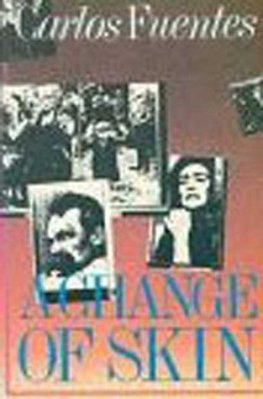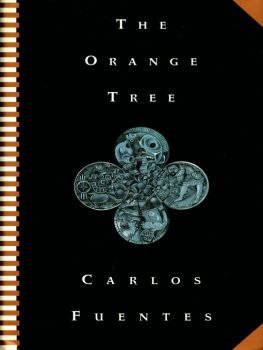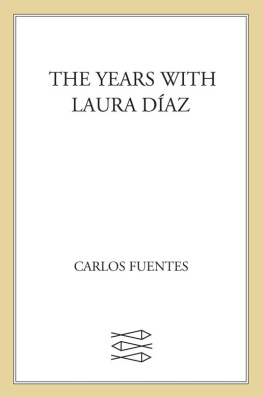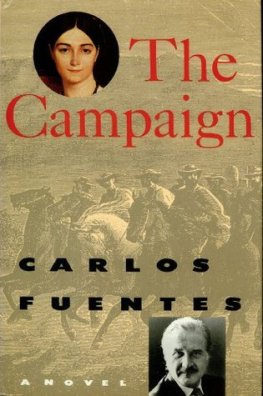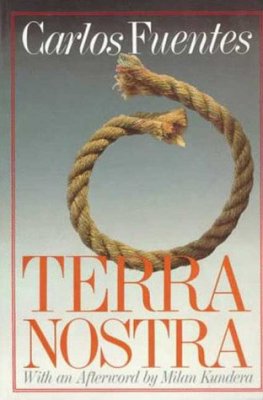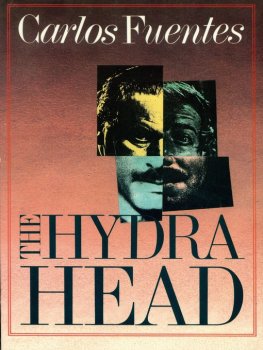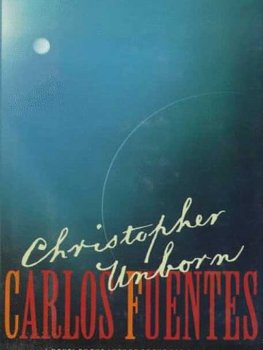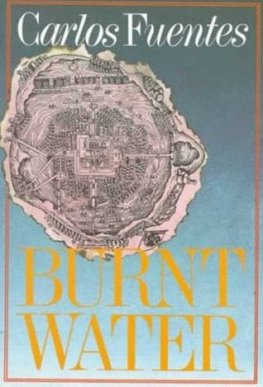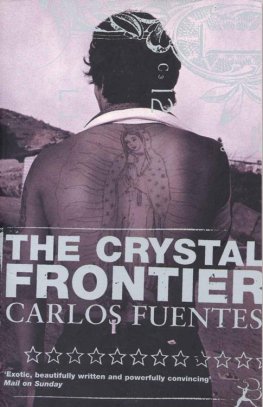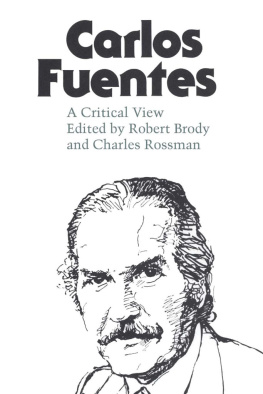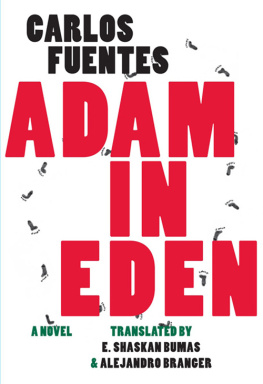Carlos Fuentes - A Change of Skin
Here you can read online Carlos Fuentes - A Change of Skin full text of the book (entire story) in english for free. Download pdf and epub, get meaning, cover and reviews about this ebook. year: 1986, publisher: Farrar, Straus and Giroux, genre: Prose. Description of the work, (preface) as well as reviews are available. Best literature library LitArk.com created for fans of good reading and offers a wide selection of genres:
Romance novel
Science fiction
Adventure
Detective
Science
History
Home and family
Prose
Art
Politics
Computer
Non-fiction
Religion
Business
Children
Humor
Choose a favorite category and find really read worthwhile books. Enjoy immersion in the world of imagination, feel the emotions of the characters or learn something new for yourself, make an fascinating discovery.
- Book:A Change of Skin
- Author:
- Publisher:Farrar, Straus and Giroux
- Genre:
- Year:1986
- Rating:3 / 5
- Favourites:Add to favourites
- Your mark:
- 60
- 1
- 2
- 3
- 4
- 5
A Change of Skin: summary, description and annotation
We offer to read an annotation, description, summary or preface (depends on what the author of the book "A Change of Skin" wrote himself). If you haven't found the necessary information about the book — write in the comments, we will try to find it.
A Change of Skin — read online for free the complete book (whole text) full work
Below is the text of the book, divided by pages. System saving the place of the last page read, allows you to conveniently read the book "A Change of Skin" online for free, without having to search again every time where you left off. Put a bookmark, and you can go to the page where you finished reading at any time.
Font size:
Interval:
Bookmark:
Carlos Fuentes
A Change of Skin
To
Aurora and Julio Cortzar
ACKNOWLEDGMENT
I wish to express my gratitude to the Society of Czech Writers and the Ministry of Foreign Relations of the Socialist Republic of Czechoslovakia for their assistance in arranging my visits in 1961 and 1963to the city of Terezin, and my conversations with survivors of the concentration camp and the old ghetto of Theresienstadt, as well as with the rabbis of the Jewish community of Prague.
Carlos Fuentes
1. AN IMPOSSIBLE FEAST
The Narrator ends his narration one September night in La Coupole and decides to employ the moth-eaten device of the epigraph. Seated at the next table, Alain Jouffroy hands him a copy of Le Temps dun Livre:
comme si nous nous trouvions la
veille dune improbable catastrophe ou
au lendemain dune impossible fte
That finished, the book begins. An impossible feast. And the Narrator, like the character of the ballad, before beginning to sing, first asks permission.
When the four of you entered today all you saw was the narrow filthy streets and the packed houses that are all alike, all of one story, all a blind wall with a too wide door of cracking wood, all daubed yellow and blue. Sure, I know, now and again you passed a dwelling that crowed money, an elegant home with windows that watch the street and boast those touches Mexicans find so irresistible, fancy wrought-iron grilles, projecting awnings of cross-ribbed canvas. But where, Isabel, were the good citizens who live behind those windows? Did they come out to welcome you to town, or did they leave that office to the dust and the filth, the misery crowded around you, the barefoot women with dark faces wrapped in shawls, the heavy pregnant bellies, the naked children, the packs of street dogs. Packs of mongrels that drift everywhere, go nowhere. Some yellow, some black, all lost, listless, strengthless, hungry, scratching at their infestations of sores and fleas, poking along gutters for garbage scraps, crippled, emaciated, with the slanted red and yellow eyes, dripping infection, that betray their coyote ancestry; white-nosed, hair worn off, bare hides splotched with scabs, torpid and purposeless as they whine the slow rhythm of this torpid purposeless town that once upon a time was the pantheon of an ancient Mexican world. Cholula, town of misery today, festering today, this Sabbath the eleventh of April, 1965, with diseased dogs and women with swollen wombs who pad the dust barefoot and laugh silently as they exchange their joking secrets and their secret jokes in voices that cannot be heard, words thinly inflected, fused chains of inaudible syllables.
Hernn Corts, man of Spain, observes the four Macehuale messengers who have come from Cholula bearing not provender but a dry reply: our caciques regret theyre unable to attend you today, Teul. They find themselves ailing, too unwell to travel here and present their gifts. Corts listens while the four Macehuales mock him and the men of Tlaxcala, formerly his enemy, now his allies, frown and mutter. Beware of Cholula and the power of the city of Mexico, they warn. They offer ten thousand men at arms to accompany him. Corts smiles. Only a thousand are needed. He will march echoing peace.
Echoing peace, the Spaniards march, making camp at the end of the day beside the river only a short league from Cholula. Their Indians throw up huts for them and join them in standing watch. Sounds in the darkness, the rustle of invisible movement through brush. The cold night. And during the night, emissaries come out from the city with chickens and corn bread that they heap around the fire before Cortss hut. His hair rumpled and his shirt open at the collar, Corts directs his interpreters to express thanks. Jernimo de Aguilar: low boots, cotton trousers. Malinche, who is the captains mistress and guide as well as his interpreter, with her black tresses and ironic smile.
You saw their children today, Isabel. The women with narrow foreheads, small teeth set in thick gums, hair in short braids, the prematurely old, shawl-wrapped young women whose bellies are big with the next child while the last holds to their hand or sleeps in their arms or rides behind wrapped in the shawl. The men who wear white shirts and drill pants and stiff varnished straw hats and pass slowly on bicycles or walk by with the tools of their labor in their hands. Youths whose skin is smooth chocolate but whose dark hair bristles. Fat men with thin ragged mustaches and worn boots and starched shirts. Soldiers with pistol in belt, cap acock, cheek or temple or throat lividly scarred by a knife gash, toothpick between teeth as they lean their shaved necks back against the columns of the arcade that faces the wide, empty, decaying plaza. The four of you visited that plaza, but you didnt stay long. A garden gone dry. A cacophonic band in the arbor interminably grinding out cha-cha-chas. Didnt you dig that cheerful little band, Pussycat? And when the band rested, didnt you dig the plaza loudspeaker that was tuned in on a local radio disc jockey who played one twist record after another, dedicating each to a local seorita? You moved away past the dreadful statues that stand before the arcade: bronze Hidalgo with the standard of Guadalupe and the legend, Remember posterity; Jurez bathed in gold, his face solemn: He was shepherd, seer, and deliverer.
At dawn the sacred citys forty thousand white houses gleam. They move toward them, crossing the band of rich tillage land, densely populated, that lies around the city. Corts, on horseback, observes water and pasture that might support great herds of cattle, but he also sees the army of beggars who have come out of the city and troop from dwelling to dwelling, marketplace to marketplace, a barefoot ragged multitude of deformities and outstretched hands, of mouths munching rotten ears of corn. The Spaniards leave behind the plots of chile peppers, corn and vegetables, agave plants, and approach the high-towered city. They are welcomed by packs of starving dogs. Cholula, pantheon city of four hundred towers, oratories, pyramids. From the towers and the esplanades and the plazas rise the sounds of trumpets and kettledrums. They are met now by a procession of caciques and priests wearing embroidered cotton robes cut like tunics and waving censers of fragrant copal. The censers are dropped when the priests see the thousand Tlaxcalans. No, they protest, we cannot allow our enemies to enter. Corts orders the men from Tlaxcala to camp in the fields and proceeds with only his Spaniards, his guard of Cempoaltecans, and the artillery. The people of Cholula look down from the flat rooftops with amazement and laughter. The horses, those gray and sorrel monsters. The crossbows, the cannon, the firelocks. Kettledrums go on booming.
Now, within the city, Corts addresses them. They must abandon the worship of idols. They must cease human sacrifice. They must no longer eat the flesh of their fellow man. They must give up sodomy and their other degeneracies, and they must swear obedience to the King of Spain, as have so many other powerful caciques. The Cholulans reply: we will obey your king but we will not forsake our gods. Smiling, they conduct the captain and his tiny arm to great lodging halls.
You walked the length of the paint-flaking arcade, Isabel, Franz beside you, Elizabeth and Javier following. Green, gray, pallid yellow. From a small grocery came smells of soap and stale cheese. Next door was an oyster bar where the owner had placed two aluminum tables and seven wicker chairs out in the open air. But no one sat to eat the oysters in the wide tall jars of gray water. Officialdom occupies the central part of the arcade. The town hall, the treasury, the headquarters of the Third Battalion. Shyster fixers and go-betweens dressed in black. The distant, unworried, coldly smiling faces of the soldiers. Police headquarters behind a red mosaic. Then the general store of the Brothers Garca: brooms and brushes, sacks, cables, wire, mats, willow baskets, and a placard over the door: Without exception of persons, we do not want gossip.
Font size:
Interval:
Bookmark:
Similar books «A Change of Skin»
Look at similar books to A Change of Skin. We have selected literature similar in name and meaning in the hope of providing readers with more options to find new, interesting, not yet read works.
Discussion, reviews of the book A Change of Skin and just readers' own opinions. Leave your comments, write what you think about the work, its meaning or the main characters. Specify what exactly you liked and what you didn't like, and why you think so.

